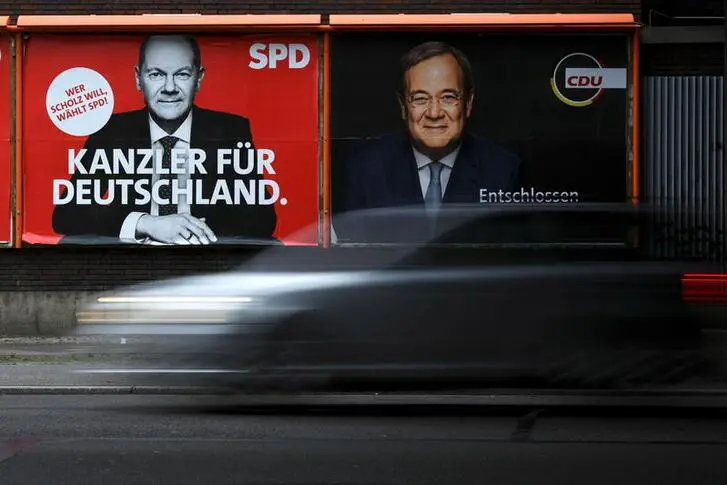PHOTO
(The author is a Reuters Breakingviews columnist. The opinions expressed are his own.)
LONDON - Nothing happens in Europe without German leadership, according to an old adage. That makes Sunday’s tight election in the region’s biggest economy particularly disconcerting. The Social Democrats’ (SPD) Olaf Scholz and his centre-right rival, Armin Laschet, will each woo the fiscally conservative Free Democrats (FDP) in a bid to form a government. That may dash hopes for big green investments and more flexible European Union budget rules.
Scholz is the ostensible winner based on early projections that give the SPD 25.5% of the vote. But the election is tight enough for Laschet’s Christian Democrat/CSU bloc, on 24.5%, to also seek to form a coalition government. To command a majority in parliament, both men will probably need the support of the Greens and FDP, which came in third and fourth respectively. That gives these two smaller parties scope to extract policy pledges and top jobs.
Things could get particularly testy in talks with the FDP, whose leader Christian Lindner wants to get Germany’s national debt back to 60% of GDP from around 70%. Hitting Lindner’s target will probably prove incompatible with Scholz’s ambition to invest more in green technologies and public infrastructure. The FDP’s manifesto proposes that Germany should be carbon-neutral by 2050, five years later than a more ambitious target shared by the SPD and the Greens, and opposes setting a firm end-date for registration of combustion-engine cars.
And the FDP chief’s insistence on debt reduction at a time when many big euro zone countries have much higher budget deficits and debt burdens relative to GDP highlights a different approach to Scholz on the European Union. The FDP leader sees pandemic-era common debt issuance as an aberration and favours the swift reinstatement of EU budget rules rather than discussions on how to make them more flexible.
Lindner’s relatively small projected vote share of around 12% should limit his influence over any future government programme. But the FDP has a history of playing hardball, having walked away from coalition negotiations after the 2017 election. Both the SPD and the CDU/CSU bloc will be courting Lindner this time. That gives him leverage, and will dilute any lingering hopes of major economic reforms.
CONTEXT NEWS
- Germany's Social Democrats (SPD) came first by a narrow margin in a Sept. 26 national election, projected results from broadcaster ARD showed.
- The party, whose candidate for chancellor is Olaf Scholz, was on track to win 25.5% of the vote as of 1759 GMT, ahead of 24.5% for the conservative Christian Democrat/CSU bloc.
- Scholz and his conservative opponent, Armin Laschet, each said they could lead the next government.
- The tight result means lengthy coalition talks will follow before a new government takes office, likely involving the Greens and the liberal Free Democrats (FDP), who came third and fourth respectively, according to the ARD projection.
(The author is a Reuters Breakingviews columnist. The opinions expressed are his own.)
(Editing by Swaha Pattanaik and Karen Kwok) ((For previous columns by the author, Reuters customers can click on PROUD/ SIGN UP FOR BREAKINGVIEWS EMAIL ALERTS http://bit.ly/BVsubscribe | liam.proud@thomsonreuters.com; Reuters Messaging: liam.ward-proud.thomsonreuters.com@reuters.net))





















